As the JICA grassroots technical cooperation project utilizing the Lake Biwa model (Study Tour) has come to an end, we would like to share an overview of the part conducted by ILEC. ILEC conducted lectures and also organized field trips (eco-tour) to inspect environmental facilities and the surrounding lake areas for the six participants from local Vietnamese government agencies (Hai Phong City and Quang Ninh Province) for two days from July 24th to 25th.
●On the first day, we conducted lectures on an overview of conservation measures for Lake Biwa and the Lake Biwa model, followed by a visit to the Lake Biwa Environmental Research Institute.
① Lecture at ILEC
During the lecture, participants asked questions about the scale and volume of wastewater treatment plants and the system of water charge. Additionally, there was a discussion about the differences in regulations between Vietnam and Japan.

② Visit to Lake Biwa Environmental Research Institute
During the lecture, a wide range of topics were presented, including Japan’s pollution issues, environmental conservation matters based on Lake Biwa’s characteristics, prefectural administrative organizations, and water quality surveys. The participants asked questions about organizational structures and budgets. Afterward, there were facility tours of the equipment analysis room, microscopy room, and biological testing laboratory.


●On the second day, field trips were conducted. In Vietnam’s Ha Long Bay, millions of tourists visit each year though, to have them learn about eco-tourism practices that consider environmental and ecological conservation and sustainable utilization of local resources, we selected Shiga’s eco-tourism as a case study.
① Gonza Tour (Preservation and Development Association for Gonza and the water town)
On the island known as “Gonza,” situated in the largest inner lake of Lake Biwa, the western part of the lake, approximately 1.5 hectares of rice paddies and 1 hectare of fields are preserved. The agricultural cooperative members value environmental conservation and sake rice cultivation and sake brewing by utilizing it, fostering the vitality for regional development. The participants expressed their impressions that the island’s landscape resembled Vietnam, and they also asked questions about taxes and government support concerning the rice paddies and fields.



② Lake Fish Cuisine Experience at the Inland Lake (at UOSADA “魚定”)
During lunch, we had the opportunity to enjoy delicious lake fish dishes, including sashimi of freshly caught Biwa salmon and simmered carp. The lake fish cuisine is offered as part of the eco-tour, aiming to promote the charm of lake fish and contribute to the development of the fishing industry.


③ Lecture by the Higashi-Omi City Eco-Tourism Promotion Council (Higashi-Omi City Forests and Waters Policy Division)
In the afternoon, a lecture on eco-tourism promotion in Higashi-Omi City was conducted. The Echi River brings the blessings of water from the Suzuka Mountain Range to Lake Biwa. Higashi-Omi City, where “forests, rivers, villages, and lake” blend seamlessly, actively promotes eco-tourism to ensure the rich local resources are inherited for the future. The participants asked questions regarding the number of tourists and the region’s traditional arts.

④ Iba Walking Tour
In the Iba village, where waterways once crisscrossed the area, there are still staircases leading to the waterways, locally known as “Kawato,” which depict the lifestyle of the past centered around water. The eco-tour is conducted as an effort to preserve the water landscape, which has been designated as a Japanese heritage, for future generations.



We hope that these eco-tourism case studies will contribute to the promotion of sustainable tourism in Vietnam’s Ha Long Bay.